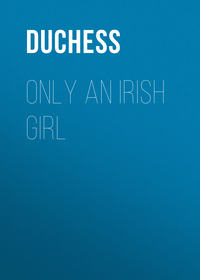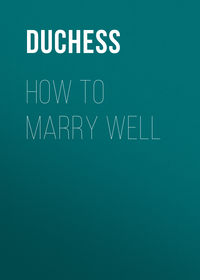 полная версия
полная версияRossmoyne
Her mind is as a boat upon a troubled sea, tossed here and there; but by and by the wind goes down, and the staunch boat is righted, and turns its bow toward home.
"Kit, do not let us go to the river to-night," she says, turning to face her sister in the narrow path.
"But why? It is so warm and light, and such a little way!"
"You have been often there. Let us turn down this side of the meadow, and see where it will lead to."
That it leads directly away from Coole there cannot be the least doubt; and the little martyr treading the ground she would not, feels with an additional pang of disappointment that the fulfilment of her duty does not carry with it the thrill of rapture that ought to suffuse her soul. No, not the faintest touch of satisfaction at her own heroism comes to lighten the bitter regret she is enduring as she turns her back deliberately on the river and its chances. She feels only sorrow, and the fear that some one will think her hard-hearted, and she could cry a little, but for Kit and shame's sake.
"Monica, who is that?" exclaims Kit, suddenly, staring over the high bank, beside which they are walking, into the field beyond. Following her glance, Monica sees a crouching figure on the other side of this bank, but lower down, stealing cautiously, noiselessly, towards them, as though bent on secret murder. A second glance betrays the fact that it is Terence, with – yes, most positively with a gun!
"Where on earth did he get it?" says Kit; and, unable to contain her curiosity any longer, she scrambles up the bank, and calls out, "Terry, here we are! Come here! Where did you get it?" at the top of her fresh young lungs.
As she does so, a little gray object, hitherto unseen by her, springs from among some green stuffs, and, scudding across the field into the woods of Coole beyond, is in a moment lost to view.
"Oh, bother!" cries Terry, literally dancing with rage; "I wouldn't doubt you to make that row just when I was going to fire. I wish to goodness you girls would stay at home, and not come interfering with a fellow's sport. You are always turning up at the wrong moment, and just when you're not wanted! – indeed you ever are!"
These elegant and complimentary remarks he hurls at their heads, as though with the wish to annihilate them. But they haven't the faintest effect: the Misses Beresford are too well accustomed to his eloquence to be dismayed by it. They treat it, indeed, as a matter of course, and so continue their inquiries uncrushed.
"Terry, where did you get this gun?" asks Monica, as breathless with surprise as Kit. "Is it" – fearfully – "loaded? Oh! don't! – don't point it this way! It will surely go off and kill somebody."
Here she misses her footing and slips off the high bank, disappearing entirely from view, only to reappear again presently, flushed but uninjured.
"What a lovely gun!" says Kit, admiringly.
"Isn't it?" says Terence, forgetting his bad temper in his anxiety to exhibit his treasure. "It's a breech-loader, too; none of your old-fashioned things, mind you, but a reg'lar good one. I'll tell you who lent it to me, if you'll promise not to peach."
"We won't," says Kit, who is burning with curiosity.
"Guess, then."
"Bob Warren?" says Monica. Bob Warren is the rector's son, and is much at Moyne.
"Not likely! Pegs above him. Well, I'll tell you. It's that fellow that's spoons on you," – with all a brother's perspicacity, – "the fellow who saw us on the hay-cart," – Monica writhes inwardly, – "Desmond, you know!"
"The enemy's nephew?" asks Kit, in a thrilling tone, that bespeaks delight and a malicious expectation of breakers ahead.
"Yes. I was talking to him yesterday, early in the day, at Madam O'Connor's; and he asked me was I your brother, Monica, to which I pleaded guilty, though," with a grin, "I'd have got out of it if I could; and then he began to talk about shooting, and said I might knock over any rabbits I liked in Coole. I told him I had no gun, so he offered to lend me one. I thought it was awfully jolly of him, considering I was an utter stranger, and that; but he looks a real good sort. He sent over the gun this morning by a boy, and I have had it hidden in the stable until now. I thought I'd never get out of that beastly garden this evening."
"Oh, Terence, you shouldn't have taken the gun from him," says Monica, flushing. "Just think what Aunt Priscilla would say if she heard of it. You know how determined she is that we shall have no intercourse with the Desmonds."
"Stuff and nonsense!" says Mr. Beresford. "I never heard such a row as they are forever making about simply nothing. Why, it's quite a common thing to jilt a girl, nowadays. I'd do it myself in a minute."
"You won't have time," says Kit, contemptuously. "She – whoever she may be – will be sure to jilt you first."
"Look here," says Terence, eyeing his younger sister with much disfavor; "you're getting so precious sharp, you know, that I should think there'll be a conflagration on the Liffey before long; and I should think, too, that an outraged nation would be sure to fling the cause of it into the flames. So take care."
"Terence, you ought to send that gun back at once," says Monica.
"Perhaps I ought, but certainly I shan't," says Terence, genially. "And if I were you," politely, "I wouldn't make an ass of myself. There is quite enough of that sort of thing going on up there," indicating, by a wave of his hand, the drawing-room at Moyne, where the Misses Blake are at present dozing.
"You shouldn't speak of them like that," says Monica; "it is very ungrateful of you, when you know how kind they are, and how fond of you."
"Well, I'm fond of them, too," says Terence, remorsefully but gloomily; "and I'd be even fonder if they would only leave me alone. But they keep such a look-out on a fellow that sometimes I feel like cutting the whole thing and making a clean bolt of it."
"If you ran away you would soon be wishing yourself back again," says Monica, scornfully. "You know you will have no money until you are twenty-one. People pretend to be discontented, at times, with their lives; but in the long run they generally acknowledge 'there is no place like home.'"
"No, thank goodness, there isn't," says Terence, with moody fervor. "I'll acknowledge it at once, without the run. To have frequent repetitions of it would be more than human nature could endure. I have known two homes already; I should think a third would be my death."
So saying, he shoulders the forbidden gun and marches off.
Monica and Kit, getting down from their elevated position, also pursue their path, which leads in a contrary direction.
"Monica," says Kit, presently, slipping her slender brown fingers through her sister's arm, "what did Terry mean just now, when he spoke about some one being 'spoons' on you? Does that mean being in love with you?"
No answer.
"Is Mr. Desmond, then, in love with you?"
No answer.
"Is he?"
"Oh, Kit, how can I answer such a question as that?"
"In words, I suppose. Is he in love with you?"
"I don't know," says Monica, in a troubled tone. "If I ever had a lover before, I should know; but – "
"That means he is," says the astute Kit. "And I'm sure," with a little loving squeeze of her arm, "I don't wonder at it."
"You must not say that," says Monica, earnestly. "Indeed, he said a few things to me, but that is nothing; and – "
"You think he likes you?"
"Yes," reluctantly.
"I believe he adores the very ground you walk on."
"Oh, no, indeed."
"If you say that, he isn't a real lover. A real one, to my mind, ought to be ready and willing to kiss the impressions your heels may make in the earth."
"That would be the act of a fool; and Mr. Desmond is not a fool."
"Ergo, not a lover. And yet I think he is yours. Monica," coaxingly, "did he say any pretty things to you?"
"What should he say? I only met him twice."
"You are prevaricating," gazing at her severely. "Why don't you answer me honestly?"
"I don't know what you call 'pretty things.'"
"Yes, you do. Did he tell you your eyes were deep, deep wells of love, and that your face was full of soul?"
"No, he did not," says Monica, somewhat indignantly; "certainly not. The idea!"
"Well, that is what Percival said to the girl he loved in the book I was reading yesterday," says Kit, rather cast down.
"Then I'm very glad Mr. Desmond isn't like Percival."
"I daresay he is nicer," says Kit, artfully. Then she tucks her arm into her sister's, and looks fondly in her face. "He must have said something to you," she says. "Darling love, why won't you tell your own Kitten all about it?"
A little smile quivers round Monica's lips.
"Well, I will, then," she says. In her heart I believe she is glad to confide in somebody, and why not in Kit the sympathetic? "First, he made me feel he was delighted to meet me again. Then he asked me to go for a walk alone with him; then he said he was – my lover!"
"Oh!" says Kit, screwing up her small face with delight.
"And then he asked me to meet him again to-day with you."
"With me! I think that was very delicate of him." She is evidently flattered by this notice of her existence. Plainly, if not the rose in his estimation, she is to be treated with the respect due to the rose's sister. It is all charming! she feels wafted upwards, and incorporated, as it were, in a real love affair. Yes, she will be the guardian angel of these thwarted lovers.
"And what did you say?" she asks, with a gravity that befits the occasion.
"I refused," in a low tone.
"To meet him?"
"Yes."
"With me?" says this dragon of propriety.
"Yes."
"But why?"
"Because of Aunt Priscilla." And then she tells her all about Aunt Priscilla's speech in the carriage, and her reply to it.
"I never heard such a rubbishy request in my life!" says the younger Miss Beresford, disdainfully. "It is really beneath notice. And when all is told it means nothing. As I read it, it seems you have only promised to forget you ever spoke to Mr. Desmond: you haven't promised never to speak to him again." Thus the little Jesuit.
"That was not what Aunt Priscilla meant."
"If she meant anything, it was folly. And, after all, what is this dreadful quarrel between us and the Desmonds all about? It lives in Aunt Priscilla's brain. I'll tell you what I think, Monica. I think Aunt Priscilla was once in love with old Mr. Desmond, and mother cut her out; and now, just because she has been disappointed in her own love-affair, she wants to thwart you in yours."
"She doesn't, indeed. Any one but Mr. Desmond might show me attention, and she would be pleased. She was quite glad when Mr. Ryde – well – when he made himself agreeable to me."
"From all you told me of him, he must have made himself dis-agreeable. I'm perfectly certain I should hate Mr. Ryde, and I'm equally sure I should like Mr. Desmond. What did he say to you, darling, when you refused to meet him even with me?" She lays great stress on this allusion to herself.
"He said I might do as I chose, but that he would meet me again, whether I liked it or not, and soon!"
"Now, that's the lover for me!" says Kit, enthusiastically. "No giving in, no shilly-shallying, but downright determination. He's an honest man, and we all know what an honest man is, – 'the noblest work of God.' I'm certain he will keep his word, and I do hope I shall be with you when next you meet him, as I should like to make friends with him."
At this moment it occurs to Monica that she never before knew how very, very fond she is of Kit.
"Oh, well, I don't suppose I can see him again for ever so long," she says. But even as the words pass her lips she knows she does not mean them, and remembers with a little throb of pleasure that he had said he would see her again soon. Soon! why, that might mean this evening, – now, —any moment! Instinctively she lifts her head and looks around her, and there, just a little way off, is a young man coming quickly towards her, bareheaded and in evening dress.
"I told you how it would be," says Kit, in a nervous whisper, taking almost a bit out of poor Monica's arm in her excitement. "Oh, when I have a lover I hope he will be like he."
Her grammar has gone after her nerve.
Monica is silent: some color has gone from her cheeks, and her heart is beating faster. It is her very first affaire, so we must forgive her: a little frightened shadow has fallen into her eyes, and altogether she looks a shade younger than usual: she is troubled in spirit, and inclined to find fault with the general management of things.
After all, she might as well have gone to the river this evening for what good her abstinence has done her: the poverty of our strength to conquer faith and the immutability of its decrees fills her with consternation and a fretful desire for freedom. Yet above and beyond all these vain imaginings is a gladness and a pride that her power is strong enough to draw her lover to her side in spite of all difficulties.
The bareheaded young man has come up to her by this time, and is holding out his hand: silently she lays her own in it, and colors treacherously as his fingers close on hers in a close, tender, and possessive fashion.
"I found the river too chilly," he says, smiling, "so I came on here. Having been unsuccessful all the afternoon and morning, I knew I should find you now."
This might be hieroglyphics to others, but is certainly English to her, however she may pretend otherwise; she doesn't pretend much, to do her justice.
"This is your sister?" goes on Desmond, looking at Kit, who is regarding him with an eye that is quite a "piercer."
"Yes," says Monica. "Kit, this is Mr. Desmond."
"I know that," says this enfant terrible, still fixing him with a glance of calm and searching scrutiny that is well calculated to disconcert even a bolder man. Then all at once her mind seems made up, and, coming forward, she holds out her hand, and says, "How d'ye do?" to him, with a sudden, rare sweet smile that convinces him at once of her sisterhood to Monica.
"We are friends?" he says, being attracted to the child for her own grace alone, as well as for the charm of her relationship to the pale snowdrop of a girl beside her.
"Yes. If you prove true to my Monica."
"Oh, Kit!" says Monica, deeply shocked; but Kit pays no heed, her eyes being fastened gravely upon the man before her. He is quite as grave as she is.
"If our friendship depends upon that, it will be a lasting one," he says, quietly. "My whole life is at your sister's service."
Something in his tones touches Monica: slowly she lifts her eyes until they reach his.
"I wish, I wish you would not persist in this," she says, sadly.
"But why? To think of you is my chiefest joy. Do you forbid me to be happy?"
"No – but – "
"In the morning and the afternoon I went to the river, to look for you – in vain; after dinner I went too, still hoping against hope; and now at last that I have found you, you are unkind to me!" He speaks lightly, but his eyes are earnest. "Miss Katherine," he says appealingly to Kit, "of your grace, I pray you to befriend me."
"Monica would not go to the river this evening because she remembered an absurd promise she made to Aunt Priscilla, and because she feared to meet you there. It is the most absurd promise in the world: wait till you hear it." Whereupon Kit, who is in her element, proceeds to tell him all about Miss Priscilla's words to Monica, and Monica's answer, and her (Kit's) interpretation thereof. "She certainly didn't promise never to speak to you again," concludes she, with a nod Solomon might have envied.
Need it be said that Mr. Desmond agrees with her on all points?
"There is no use in continuing the discussion," says Monica, turning aside a little coldly. "I should not have gone to the river, anyway."
This chilling remark produces a blank indescribable, and conversation languishes: Monica betrays an interest in the horizon never before developed; Mr. Desmond regards with a moody glance the ripening harvest; and Kit, looking inward, surveys her mental resources and wonders what it is her duty to do next.
"For aught that ever I could read,Could ever hear by tale or history,The course of true love never did run smooth."This much she knows; and to any one blessed with a vision sharp as hers it is very apparent now that there is a roughness somewhere. She knows too, through many works of fiction, that those in attendance on loving couples should at certain seasons see cause to absent themselves from their duty, and search for a supposititious handkerchief or sprain an unoffending ankle, or hunt diligently in hedgerows for undiscoverable flowers. Three paths therefore lie open to her; which to adopt is the question. To return to the house for a handkerchief would be a decidedly risky affair, calculated to lead up to stiff and damning cross-examination from the aunts, which might prove painful; to sprain an ankle might prove even painfuller; but to dive into the innocent hedgerow for the extraction of summer flowers, what can be more effectual and reasonable? she will do it at once.
"Oh, what lovely dog-roses!" she says, effusively, in a tone that wouldn't have deceived a baby; "I really must get some."
"Let me get them for you," says Desmond, gloomily, which she at once decides is excessively stupid of him, and she doing all she can for him too! She tries to wither him with a glance, but he is too miserable to be lightly crushed.
"No, thank you," she says; "I prefer getting them myself. Flowers are like fruit, much more enjoyable when you pick them with your own hands."
So saying, this accomplished gooseberry skips round the corner, leaving Monica and Mr. Desmond tete-a-tete.
That they enjoy their sudden isolation just at first is questionable: Monica discovers blots on the perfect horizon; and Mr. Desmond, after a full minute's pause, says, reproachfully, —
"You didn't really mean that, did you?"
"Mean what?" uncompromisingly, and without changing position.
"That even if matters had been quite – quite comfortable with us, you would not have gone to meet me at the river?"
"I don't know," in a low tone.
"Say you didn't mean it."
"I – suppose I didn't," even lower.
"Look at me, then," says Mr. Desmond.
Kit, in her high, sweet voice, is warbling that little, pretty thing about a "lover and his lass," in the next field. The words of her song, and its silly refrain of come to them across the corn and scented meadow. Monica, with her hand in his, smiles faintly.
"A hey, and a ho, and a hey nonino,""You hear what she sings, – 'that life is but a flower:' is it wise, then, to set your heart upon – "
"You?"
"I meant, an impossibility."
"Which you are not. You shall not be. I don't believe in impossibilities, to begin with; and, even if it were so, I should still prefer to be unwise."
"You are defiant," she says, lightly; but her smile is still very sad.
"I have hope. 'Affection's ground is beyond time, place, and all mortality,' as we read. I shall conquer yet; yes, even your prejudices. In the mean time, give me fair play; do not harden your heart against me."
"I wish mine was the only hard heart you had to contend against," returns she, with a faint sigh. But this remark seems to drop so carelessly from her lips that, though elated by it, he is afraid to take any open notice of it.
"I hope your aunts were not cross to you last evening on my account?" he says, anxiously.
"No. Nothing was said, more than Kit told you, except that Aunt Priscilla touched upon the point of introduction. Oh, what a fright I got then! If she had persisted in her inquiries, what would have become of me?"
"Couldn't you have – " began Mr. Desmond, and then stops abruptly. A glance at the face uplifted to his checks his half-uttered speech effectually, and renders him, besides, thoroughly ashamed of himself.
"If I had to confess there had been no introduction," goes on Monica, laughingly, "I don't know what would have been the result."
"The deluge, I suppose," returns her companion thoughtfully.
"What a pity you have an uncle at all!" says Monica, presently. "It would be all right only for him." She omits to say what would be all right, but the translation is simple.
"Oh, don't say that," entreats Desmond, who has a wholesome affection for the old gentleman above at Coole. "He is the kindest old fellow in the world. I think, if you knew him, you would be very fond of him; and I know he would adore you. In fact, he is so kind-hearted that I cannot think how all that unfortunate story about your mother ever came about. He looks to me as if he couldn't say 'Bo to a goose' where a woman was concerned and yet his manner to-night confirmed everything I heard."
"He confessed?" in a deeply interested tone.
"Well just the same thing. He seemed distressed about his own conduct in the affair, too. But his manner was odd, I thought: and he seems as much at daggers drawn with your aunts as they with him."
"That is because he is ashamed of himself. One is always hardest on those one has injured."
"But that is just it," says Mr. Desmond, in a puzzled tone. "I don't believe, honestly, he is a bit ashamed of himself. He said a good deal about his regret, but I could see he quite gloried in his crime. And, in fact, I couldn't discover the smallest trace of remorse about him."
"He must really be a very bad old man," says Monica, severely. "I am perfectly certain if he were my uncle I should not love him at all."
"Don't say that. When he is your uncle you will see that I am right, and that he is a very lovable old man, in spite of all his faults."
At this Monica blushes a little, and twirls her rings round her slender fingers in an excess of shyness, and finally, in spite of a stern pressure laid upon herself, gives way to mirth.
"What are you laughing at now?" asks he laughing too.
"At you," casting a swift but charming glance at him from under her long lashes. "You do say such funny things!"
"Did you hear there is to be an afternoon dance at the Barracks next week?" asks he presently. "I was at Clonbree on Thursday, and Cobbett told me about it."
"Who is Cobbett?"
"The captain there, you know. He was at Aghyohillbeg yesterday. Didn't you see him, – a little, half-starved looking man, with a skin the color of his hair, and both gray?"
"Oh, of course – now I remember him," says Monica, this fetching description having cleared her memory. "I thought to myself how odd he and the other man, Mr. Ryde, looked together, one as big as the other was little."
"I think there is more matter than brains about Ryde," says Desmond, contemptuously. "Do you think your aunt will let you go to this dance at Clonbree?"
"Oh, no; I am sure not. My aunts would be certain to look upon a dance in the Barracks as something too awfully dissipated."
"For one reason I should be glad you didn't go."
"Glad?" opening her eyes.
"Yes. That fellow Ryde never took his eyes off you yesterday."
"Is that a crime?"
"In my eyes, yes."
"And you would wish me to be kept a prisoner at home just because one man looked at me?"
"I don't want any one to look at you but me!" Then he comes a little closer to her and compels her, by the very strength of his regard, to let her eyes meet his. "Do you like Ryde?" he asks, somewhat imperiously. "Monica, answer me."
It is the second time he has called her by her Christian name, and a startled expression passes over her face.
"Well, he was nice to me," she says, with a studied hesitation that belongs to the first bit of coquetry she has ever practised in her life. She has tasted the sweetness of power, and, fresh as her knowledge is she estimates the advantage of it to a nicety.









